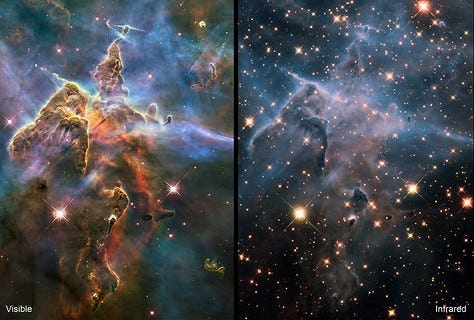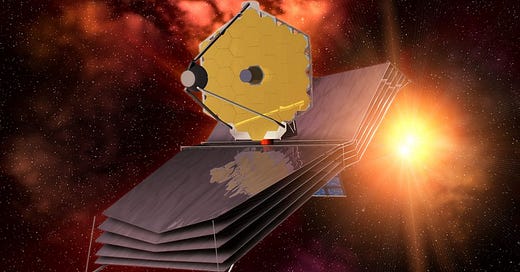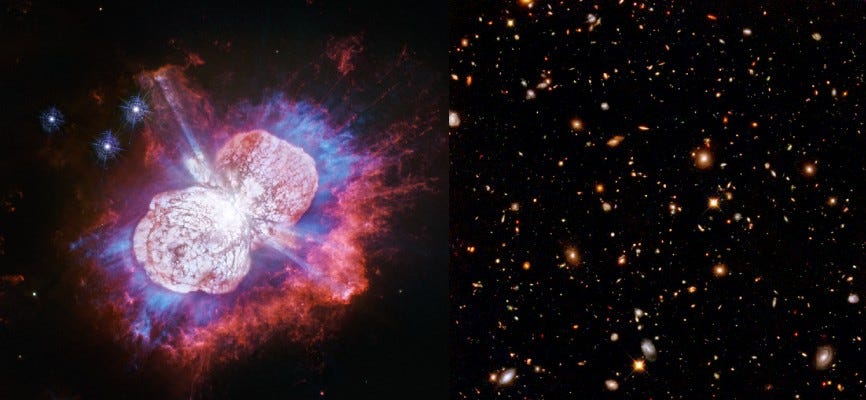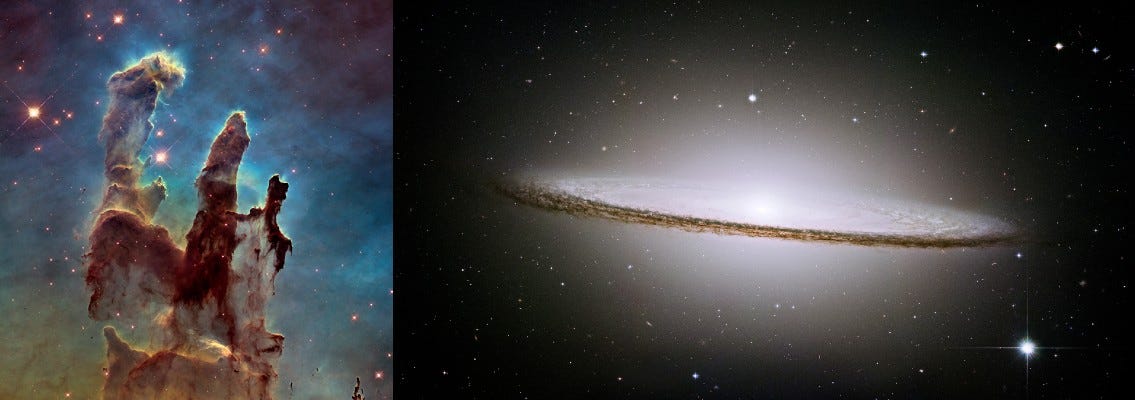The Next Month Will be Huge for Science, Government, Nerds Generally Speaking
A new telescope will either expand our horizons or empower cynics
Friday, Christmas Eve, will see a continuation of one of the government’s weirdest traditions: NORAD’s corny “we’re tracking Santa on our radar” bit. This is surely the crappiest comedy bit by any trans-national military organization. In a tradition dating to 1948, NORAD — the group tasked with watching for incoming nuclear annihilation from Russia — does a little lighthearted holiday schtick for the kiddies. “Whuh oh,” they say, “We’ve got an unidentified sleigh pulled by eight tiny reindeer entering our airspace!” Hopefully, this happens at a moment when nuclear doom is not approaching from the north. NORAD has gone so far as to make a Santa Tracker app; I wonder how many friendly fire incidents a soldier needs to be involved in before they get sentenced to run NORAD’s Santa Tracker app.
What’s the point of this? How do you even broach this with your kid?
Dad: Hey, Junior: Whaddya say we see what NORAD’s up to?
Junior: What?
Dad: The North American Aerospace Defense Command! The joint military venture between the US and Canada tasked with monitoring our shared airspace! Let’s pop over to their web site and see what’s up.
Junior: Why in the world…
Dad: Look: I just want to have some goddamned family fun browsing the web site for the group that watches for nuclear Armageddon! And…hey, what’s this! Reports of a sleigh and eight tiny reindeer!
Junior: How do they know it’s not an intercontinental ballistic missile?
Dad: Uh…they can tell.
Junior: Is that a risk we should be taking? Shouldn’t we blast whatever it is out of the sky?
Dad: Look, it’s not real, okay! It’s just a bit that the military does around the holidays for a little lighthearted Christmas cheer.
Junior: Why is the government doing schtick?
An infinitely-more-purposeful joint government venture will take to the skies the very next day: The crappily-named James Webb Space Telescope (aren’t all acronyms supposed to spell something these days?) is set to be launched on Christmas morning. This is an enormous moment in space exploration; it will either be one giant leap for mankind or one huge-ass fireball that will incinerate three decades of work and untold amounts of future space funding. The launch also comes at a time when government agencies are facing a crisis of credibility and could really use a win. As someone who cares about both space exploration and good governance (form a line, ladies!), I feel like the stakes are extremely high.
The JWST — pronounced “juwusst” (see: that doesn’t work) — is the successor to the Hubble telescope. Hubble, though initially mocked as a failure (more on that in a bit) has been wildly successful. It was built to work for 15 years, but has lasted more than 30. It’s made 1.3 million observations — a truly Seinfeldian rate of observing — and its data have been published in more than 15,000 scientific papers. This makes it possibly the most productive scientific instrument ever built. Plus, it’s produced mind-blowing images like these, which — in perhaps the most amazing development of all — are in the public domain:
It absolutely fries my brain to know that this stuff exists. I’m awestruck by the things human beings know; we know the age of the universe, the size of our galaxy, how the planets formed, and the basic story of how all things came to be. On our planet at least, this knowledge is unique to human kind. I sometimes look at these photos, ponder the incredible advances made by human kind in our oh-so-brief time on Earth, turn to my cat, and say: “Fuck you.”
The Webb telescope is Hubble’s successor. It’s a hundred times more powerful than Hubble; it can see Lincoln’s face on a penny from 24 miles away, thus allowing us to scrounge for loose change on other planets. It can also see infrared light; Hubble only sees visible light, but Webb picks up light in other parts of the spectrum, as shown here:
The most powerful infrared space telescope in history is the Spitzer Space Telescope. Spitzer’s mirror is 0.85 meters across; Webb’s mirror is 6.6 meters across. Suffice it to say: The Spitzer Space Telescope is a total piece of shit. What a hot diaper full of horse semen; no wonder we named it for the disgraced Governor of New York before the disgraced Governor of New York before the disgraced Governor of New York we just replaced.1 At any rate: Infrared vision makes more stars visible — here’s a comparison:

That’s right: The universe is about to look all bedazzled ‘n shit.
Infrared vision lets us see far back in time, to the early days of the universe. Webb will be able to see objects that formed only2 100 million years after the Big Bang; the oldest objects Hubble has seen date to roughly 400 million years after the Big Bang (meanwhile, Spitzer couldn’t spot on old galaxy if the galaxy kicked it in the dick). Some have called these early images “baby pictures”, which is a great way to make one of humanity’s awe-inspiring achievements seem trite and uninteresting. Still, we’ll probably learn a lot about how galaxies formed.
We’ll also learn a lot about possible life on other planets. Scientists plan to observe Enceladus and Europa, two moons that appear to have oceans beneath icy surfaces. Previous missions detected plumes of water vapor; Webb will analyze the plumes to search for signs of life. It will also look at planets outside our solar system and tell us about their mass, atmosphere, color, seasons, rotation, weather, and even the possible presence of vegetation. They can do this by analyzing a very faint dot, which I don’t understand, but hey: I don’t fully understand why they can’t put Webb in front of Hubble and make it as powerful as both telescopes combined!!! But what I do and don’t understand isn’t important; what’s important is that we’ll learn more about possible life in the universe.
Or, not. This is an incredibly sensitive mission. Webb program scientist John Mather called the project “about the hardest thing we've ever done for NASA astronomy." Once launched, the telescope will deploy itself over the course of about a month,3 a process that involves 344 “unique-point failure items”. A failure at any point could doom the mission, because Webb will be too far from Earth to be repaired. Also, if Webb explodes during its Christmas Day launch, then someone at NASA will have to turn to camera and say: “Ho ho ho: That was 10 billion dollars and 25 years worth of work that just vaporized in the atmosphere.” I’m not comforted by the fact that the rocket is European-made, which means it’s probably some three-cylinder stick shift thing that runs on diesel.
And now’s the point at which we need to remember how disastrous Hubble’s early days were. Hubble’s mirror was slightly misshapen, causing it to return out-of-focus images of almost Spitzer-like crappiness. A repair mission conducted three years after launch corrected the problem, but during those three years, Hubble was a symbol of government incompetence.
It was also a laughingstock. Jay Leno, in particular, helped cement Hubble’s image as an expensive failure — here’s a 2009 article that notes Leno’s role, and here he is mentioned in 2015, and here again 2015, and here in 2018. That last article even relays a joke from an early-90s broadcast:
LENO: “What sound does a space turkey make? Hubble, Hubble, Hubble!”
ZZZZZZZZZZZZZZZZZING! Oh Molière, thine rapier wit is born anew in late night comedy! I just can’t believe they let Leno say “space turkey” on NBC.
As a long-time late night Gag Wrangler myself, I’m forced to think about the impact comedy has on the real world. For all the JOHN OLIVER SKULL-FUCKS THE ELECTORAL COLLEGE headlines that we garnered during my time at Last Week Tonight, in most cases, it seems pretty clear that we didn’t change a goddamned thing. It would be a cruel irony if the exception to the “nothing you do matters” rule is Jay Leno cracking jokes about a program that ended up being one of the most successful projects in scientific history.
Not that I really blame Leno for the jokes. If NASA spends 15 years and $1.5 billion (in 1990 dollars) on a telescope that doesn’t fucking work, what are you supposed to do? Say “nice try” and throw NASA a parade? Jokes are in-bounds. Though, it’s unfortunate that Hubble’s early struggles probably contributed in some small way to Grover Norquist-style anti-government nihilism, as well as mistrust of experts, generally. Even more unfortunate is the effect that Hubble had on the bureaucracy; it almost certainly made it slower-moving and less efficient.
I’ve written before about how terrified bureaucrats are of Congressional hearings. Hearings play the same role in a political appointee’s career that the sand worms do in Dune: They’re a source of unremitting terror. The Hubble mistake led to high-profile hearings; NASA bigwigs were hauled before Congress one by one, and none of them were allowed to yell “Well then you make a space telescope if you’re so fucking smart!” It was a PR disaster that any politico would gladly trade what’s left of their soul to avoid.
This contributes to a risk-averse mentality. The dominant thought in many bureaucrats’ minds is: Just don’t screw up. One reason why I’m pro-private space exploration (while also being pro-NASA) is that the private sector operates under more normal risk/reward calculus. They can do things NASA can’t, specifically: Fuck up. This helps them reduce costs, because the cost of taking a project from 99 percent certainty to 99.999 percent certainty can be enormous.
NASA’s great at building things, but they’re awful at controlling costs or delivering things on time. The Webb telescope is billions of dollars over budget and 14 years late. This Atlantic article discusses “Hubble psychology”, which I would summarize as an obsession with avoiding mistakes. Delays and cost overruns are acceptable — once you’ve spent a few billion, you’ll probably have success if you go before the Senate Committee On Sunk Cost Fallacy and ask for a billion more. What’s not acceptable is a high-visibility fuck-up. People will go to great lengths to avoid having Jay Leno call them a “space turkey”.
If Webb doesn’t work, there will be a fresh round of backlash against experts and government agencies. Much of it will be of the “what kind of an idiot fucks up the aft pallet deployment of the near-infrared spectrograph!” variety — as if we all do aft pallet deployments of near-infrared spectrographs all the time — but that won’t make it illegitimate. People have a right to expect their government to work. That’s especially true given the take-every-precaution environment that we’ve created; the only benefit of timely, expensive, caution-fetishizing processes is that at least when you get to the end, the thing fucking works.
I just really don’t want a “the experts are all dummies!” moment right now. Covid has been a Hubble-times-a-million event for many institutions, and it’s been disappointing and disorienting. Just this week, there was an article about how CDC Director Rochelle Walensky used a misleading study to inform her decision about school mask mandates. It’s a maddening unforced error by the CDC, and it’s not their first. The last thing we need right now is yet another event that shakes our faith in institutions and expertise in the form of a $10 billion dollar satellite turning into $40 worth of scrap metal somewhere over Central America.
The Webb telescope could be a generation-defining scientific achievement on the order of Hubble. It could advance our knowledge of the universe in countless ways. It could also demonstrate the viability of inter-governmental projects, since it’s a collaboration between NASA, which oversaw most of the telescope construction, the European Space Agency, which built the rocket, and the Canadian Space Agency, which is providing soda and snacks for the launch.
Ironically, if Webb succeeds, it’s likely to get a fraction of the attention that it would have gotten if it failed. For whatever reason, “NASA Shoots $10 Billion Down Galactic Toilet” is a juicier story than “We Know How the Universe Was Formed”. That environment creates the extreme risk-aversion that leads to bloated budgets and timeframes, which in turn feeds negative views of government. I don’t quite know what to do about the fact that things work best when people trust experts and institutions, but that experts and institutions don’t always deserve their trust. I just know that I’d really like to see the institutional experts put a “W” on the board.
In researching this piece, I came across a blog post by Jay Leno’s former Head Writer, a guy name Joe Toplyn. Despite the fact that reading a blog post from some ex-late night comedy writer struck me as the world’s most colossal waste of time, I read it. In the post, Toplyn talks about an encounter with one of the astronauts who repaired the Hubble. Toplyn speaks glowingly about the astronaut and even has kind words for the Hubble, calling it the tool scientists used to “unravel the secrets of the universe.” Reading it made the paradox I just described seem a little less paradoxical. After all, a guy who surely wrote more than a few jokes about the Hubble still understood the scale of the achievement, which shows that criticism doesn’t have to turn into cynicism. Hopefully, the distinction between the two is clear in most people’s heads. Of course, if $10 billion worth of technology turns into a fiery ball of wreckage on Christmas Morning — possibly taking out Santa in the process — cynicism will be hard to avoid. Which is why I’m really, really hoping that doesn’t happen.
It was not named for Eliot Spitzer; it was named for Lyman Spitzer, Jr., an astronomer. And FWIW, the recently retired telescope was a successful project; me pretending that it sucks is just a bit.
The universe is about 13.8 billion years old, so in this context, 100 million years can be labeled “only 100 million years”.
And after that month, it will need about six months to become fully operational.








"...the Canadian Space Agency, which is providing soda and snacks for the launch."
Listen dude. As a Canadian I totally resent this. Up here it's called Pop.
You have hit the nail on the head. The problem is, it is so easy to score cheap political points by complaining about government. Even my Mom reflexively trashes the post office and the DMV, although the post office was very reliable before DeJoy and our local DMV is incredibly efficient and customer centric.